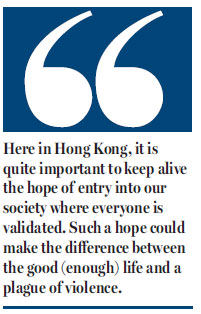The thin line separating the ethics of conviction and responsibility
Updated: 2016-01-08 08:13
By Gabriel Donleavy(HK Edition)
|
|||||||
Max Weber, one of the founders of sociology, distinguished between the two kinds of ethical frameworks we all carry around with us. They help us understand why quiet, law-abiding citizens suddenly become protesters and vice versa. The ethics of responsibility are the day-to-day ethics that keep us doing our domestic duty, obeying the orders of our bosses at work, earning our living at work when we feel alienated, and keeping our mouths shut when more powerful people than us say things we utterly disagree with. This compromise with everyday worldly reality is justified in our heads as necessary to keep our lives intact, keep our families together, keep the money coming in and generally allow us to live up to our responsibilities. That is why it is named the ethics of responsibility.
The ethics of conviction are what we think are our real beliefs about how people should be, how society should be run, how political issues should be decided and what we think of as right and wrong. Our ethics of conviction rarely match our ethics of responsibility. Every day we have to compromise our ethics of conviction to keep our job, keep our family, keep our freedom or keep a roof over our heads. Societies in advanced economies generally are populated by people for whom the ethics of responsibility are real but the ethics of conviction are just words. Countries torn apart by religious or ideological wars show us what ethics of conviction cause when allowed to overcome ethics of responsibility, since my notion of right might be your version of wrong.
Worse, we may both have the same notion of right but come to blows over whose implementation of it is better. Worse still, we may cause a civil war because I revere one dead man the most but you revere a different man. How can such nonsense be worth dying for? People informed by the ethics of responsibility easily consider political, ideological and religious fervor a dangerous insanity to be crushed at any cost.
Young people, students, voluntary soldiers, lottery winners and people entirely outside society like the homeless, the incarcerated and the criminal - all of these people have ethics of conviction and may be less constrained by ethics of responsibility than the rest of us. Many will change when they get a well-paid job, marry and have children or just get tired. Meanwhile, they will take personal risks to express their convictions because their beliefs are who they are, and to think of curbing them is a kind of suicide. Some of their movements will hurt people, will cause loss of livelihood if not loss of life; but they will use the easily accessed utilitarian rationalization that the greater good justifies a bit of collateral damage, including damage to themselves.
Ordinary people laboring under their ethics of responsibility have to turn a blind eye to abuses, atrocities, corruption, abuses of power, favoritism, manifest deceit, victimization of minorities and many injustices. Sometimes the stress of switching all that off gets too much and the pressure to do something about it becomes too much to bear. Suddenly someone joins a movement and feels a great relief and that suddenly real life has been discovered. The world was previously black and white. Now it is in color. In extreme cases it is no longer finding something worth living for. It is finding something worth dying for. Here are the roots of military enlistment in armies for a cause or for a country. The ethics of conviction relieve you of the burden of your ego in favor of fusion with the cause, the tribe, the race, the great and the good.
Some people stay high till their cause brings them to a final battle with the enemy or with authority that causes their own death. Others find their enthusiasm steadily draining away as they notice the leaders of their cause are weak, self-indulgent and possibly also corrupt. They may find the freedom they sacrificed willingly to the leaders they used to look up to turns out to have been for people they are beginning now to despise. They now long to return to the ordinary world of the ethics of responsibility. Family may welcome them back, but society demands atonement and authentication of their sincerity. Some are locked out permanently from rehabilitation as a result, and they form the hard core of the new kind of threat to established society.
These new outsiders have nothing much to lose and have no way into normal society. They lose their connection with humanity; they feel nothing much when they commit inhuman acts. When the Saddam Hussein's civil service and army in Iraq were disbanded after his defeat by the Western allies, the first members of ISIS were created. Here in Hong Kong, it is quite important to keep alive the hope of entry into our society where everyone is validated. Such a hope could make the difference between the good (enough) life and a plague of violence.
The author is professor of accounting in the New England Business School at the University of New England in Armidale, Australia.

(HK Edition 01/08/2016 page10)